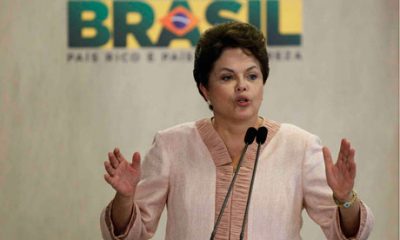By
Anant Mishra
Voters should choose development over hypocrisy.
When Brazilians elected Dilma Rousseff in 2010, the nation hoped for a better governance and financial stability. Before that year economy expanded by 7.5%, an exponential growth in trade and investment and a steep fall in poverty resulting. But this didn’t last long. The nation saw growth during the leadership of Inacio Lula D Silva, Ms Rousseff’s political mentor and party leader of the Centre Left Workers Party (PT). But after the election of 2010, the promise has indeed disappeared. Under Ms Rousseff the economy slowed gradually and the social program stalled.
Leaving the sanction hit Russia aside, Brazil became the weakest performing nation among the BRICS club of emerging economies. Struck by poverty and unemployment, millions of Brazilians took to the streets to protest against the poor public services and political corruption.
Ever since the announcement of the presidential elections of 2014, polls have shown two thirds of the respondents desiring the next president to be different. So one might expect a tough challenge from the opponents to Ms Rousseff, who indeed will take these polls seriously. In the October 5th by polls, she secured 41.6% of the vote and remained favourite contender to the upcoming election on October 26th. That might me possible as many Brazilians have not experienced the chill of failing economy, but none the less they soon will. Meanwhile for the development of poor Brazilian farmers, the Centre Right Wing candidate Aecio Neves (PSDB) has made reforms which will benefit the farmers more than harming them. His agenda lies on the grass root of development and individual stability in the society. If Brazil wants to prevent this economic drift, it is essential he succeeds in elections.
A Campaign of Tragedy
Mr. Neve’s task became harder when he faced a very troubled situation, similar to the Brazil Telenova. Two months ago, the third competitor for the presidential elections Eduardo Campos died in a plane crash on his way to the rally. His former running mate, Marina Silva replaced him and jumped into the political battleground with the sympathetic feelings from his voters. An environmentalist, Ms Silva became darling of the protestors and became a symbol of “new politics”. Attractiveness however might lead to the finish line but on the presidential seat, an eye for development and opportunity is a must. However she repelled all the accusations made from other contenders and remained strong throughout the campaign. In the end, her shares of 21% in the polls lead her to an increase in polls as compared to 2010. In spite of the twist and turns of “new politics”, the battle remains among the two political giants PT and PSDB in the presidential elections of 2014.
In this election Ms Rousseff’s main point on the agenda is full employment, higher wages, effective social programs such as Bolsa Familia and low cost housing along with electricity and water programs. The agendas are big and, if implemented, will change the course of Brazil, but the question again arises, if implemented, as currently the nation is suffering from failures in economy and politics.
The troubled world economy alongside the commodity boom has affected Brazil. Ms Rousseff constant switch in macroeconomic policies and poor management of private sector has led to the fall in investment. However she made few efforts to tackle Brazil’s problems in economic growth and markets but problems such as poor infrastructure, high costs, and punitive tax system and maintaining of red tape with rigid labour code from Mussolini days, have to be taken care of first.
Instead she has reviewed Brazil’s corporate state banks giving out fall over, giving out tax breaks and subsidised loans from state banks. Her policies damaged Petrobras, the leading state run oil company and ethanol industry by keeping the oil prices to prevent inflammatory impact on her loose fiscal policy. However a bribery scandal in the Petrobras clearly showed that it’s the PT that cannot be trusted other than its national jewel.
This corporate state of veracious insiders clearly symbolise Ms Rousseff’s large coalition of 39 members staff and their work. Brazilians emptied their pocket as the taxes during her reign increased to 36% of that of GDP, far higher than the countries with a similar development. Moreover Ms Rousseff seems pretty confident in this situation as her lack of political touch, shows no sign of lessons learnt from the past.
It’s time to change
Ms Rousseff’s candidacy entirely depends upon the flaws of Ms Neves. They left find him as an unstable politician and their accusation of Neves axing Bolsa Familia is nowadays common street talk. Neve, the governor of Minas Gerais, was found to have spent public money on a small town airstrip close to his farm. Political legends like Lula, who always had an ear for the poor considered PSDB as the heartless fat cats.
In spite of all the lobbying and backdoor communications Mr Neve’s policies will benefit the poor Brazilians as well as the prosperous ones. He promises to bring the nation back to economic growth, as his records and that of his party make this credible. During the presidency of Fernando Henrique Cardoso in the 1990s, PSDB eliminated inflation and laid the path of progress. As a two time governor Mr Neves turned Minas Gerais, Brazil’s second most populous state from a financial basket case into a good example of administration and consists of nation’s best schools. He is supported by an impressive team of advisors, under the leadership of Arminio Fraga, a former Central Bank Governor respected among investors. Moreover his team promises to cut down a number of ministries, simplify tax system and boost private investment.
Mr Neves indeed deserves to win. He has fought a tough and a long campaign and guarantees that his economic policies will work. The biggest threat to social programmes is the miss engagement of economy. Brazil is a nation that needs growth and development to compete in the world. Mr Neves is likely to deliver this message more than Mr Rousseff is.



No Comments Yet!
You can be first to comment this post!